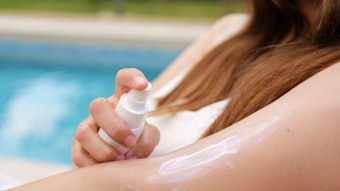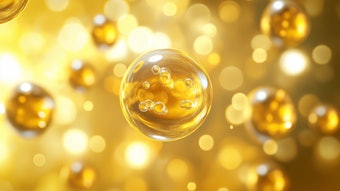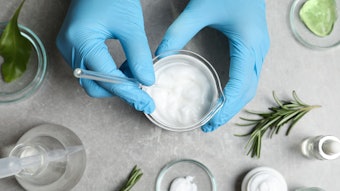
Yemoja, Ltd. has introduced EPS Revive (INCI: Not Provided), its algae-derived external polysaccharide sulfate (EPS) active for skin care.
Related: Yemoja Launches On-demand Microalgae
This bioactive ingredient from the Porphyridium cruentum species of microalgae can be formulated in cosmetics for its natural anti-aging, anti-inflammatory and rejuvenating properties.
According to Yemoja, this active is the first bio-active ingredient to be produced from the red algae in a controlled lab environment using photobioreactor technology. Additionally, the company states there is peer-reviewed research data available, which showcases the soluble EPS fraction’s antioxidant, moisturizing and anti-aging activities.
The company’s closed-cultivation system is not dependent on external environmental factors or impact from climate fluctuations, enabling the company to provide the cosmetic market with customizable EPS year-round.
Regarding customization, Yemoja can increase the amount of sulfate bound to the EPS using protocols that take place during the cultivation phase of the algae. The product therefore can be delivered at variable concentrations in gel form or delivered as pure powder.
An ex vivo trial has exemplified the anti-aging and anti-inflammatory effects of EPS Revive. In the study, the EPS was shown to preserve the integrity of the connective tissue between the dermal layers in a depleted culture medium.
It is believed that EPS' sulfate content and structure act as reactive oxygen species scavengers and protect the skin from aging. They also inhibit various inflammatory markers, including TNF-a and IL6 cytokines.
EPS-Revive has undergone clinical trials with results supporting its safety for topical use. The technology can be integrated into creams, lotions and various other topical applications.
Further clinical trials are currently in the works to evaluate all the effects of this product for maintaining skin health in regards to all skin types.
Meanwhile, "waste" biomass separated during the process undergoes an additional process in order to produce another product, intercellular polysaccharide sulfated (IPS). According to the company, this product is still under research and development.
IPS is believed to hold potential for cosmetic use because it contains all the benefits of EPS with the inclusion of the algae’s red pigment, phycoerythrin. This pigment has already been proven to have an immune-modulation activity.
Previously: Yemoja Opens Sustainable Microalgae Plant
IPS can be added into natural cosmetic formulations as an active ingredient, as well as a colorant.
“EPS molecules are synthesized within the red Porphyridium cruentum microalgae under high-stress conditions,” explained Amikam Bar-Gill, Ph.D., CTO of Yemoja. “This exerts a protective mechanism that safeguards the algae’s cells from dehydration, pH shifts and bacterial infections. During cultivation, the EPS is secreted by the algae and dissolved within the growth media (seawater), which is later separated from the biomass for ultra-filtration in order to concentrate the EPS into its final gel form.”
Featured: Choosing the Right Microalgae for the Job
“More companies are working to create an ‘all-natural' brand by using plant-based or algae-based substances, with emphasis on ‘green’ processes and chemical-free end products,” said Erez Ashkenazi, CEO of Yemoja. “While the demand for the product is high, Yemoja is a player in that we can provide a steady supply of the valuable and standardized raw material. We cultivate only natural wild-strain algae through an automated, fully controlled and contaminant-free downstream process. We use no chemicals or solvents and we do not exploit any natural resources from the environment. We are exploring possibilities for integrating our aqueous solution into food supplements and branching out to the beauty-from-within sector.”
“Porphyridium polysaccharide is a potent antioxidant and effective anti-inflammatory agent that imparts a high affinity to skin support and already is in use in nearly 300 cosmetic formulations worldwide,” added Bar-Gil. “We also plan to investigate its possible capacity for alleviating medical dermal issues, such as atopic dermatitis and psoriasis in the near future.”










